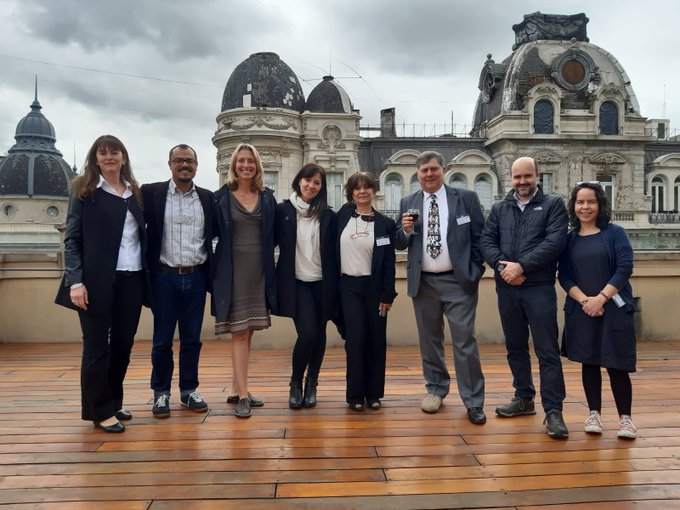FARMS-SAFE project in Argentina
FARMS-SAFE: Future-proofing Antibacterial resistance Risk Management Surveillance and Stewardship in the Argentinian Farming Environment
What is the problem?
Antimicrobial drug resistance (AMR) is a global threat to health and development and a problem that is getting steadily worse. Within Latin America, Argentina has been tracking levels of AMR in human infections for over 30 years and was the first country in the region to develop a national strategy for the control of AMR. However, data for antimicrobial use is extremely limited and the amount of AMR bacteria on farms and in the near-farm environment is poorly understood.
Furthermore, whilst antibiotic residues are monitored in foodstuffs entering the formal market, there is a significant informal market, and antibiotic levels in the environment are not routinely measured. One potential response to the rising threat of AMR is regulation, and both international organisations - led by the World Health Organisation - and individual countries have sought to formulate, for example, new regulatory frameworks to address the use of antimicrobials in farming, as well as the management of farm waste. The UK government recognises that developing countries like Argentina need support and information to adequately train veterinarians, develop regulations, build surveillance capacity and improve farming practices with a view to addressing AMR.
Research programme
The premise of FARMS-SAFE is that, as well as providing better surveillance information for AMR and antimicrobial usage (AMU), extra support for Argentina and other Latin American countries should encompass a risk-based approach to the design of regulation as well as to the strengthening of enforcement capacities, as their weakness is another source of risk.
FARMS-SAFE addresses this issue by reference to four key risk areas via a UK/Argentinian research consortium of veterinarians, microbiologists, epidemiologists, social scientists and stakeholders:
- Animal disease as a driver of AMR risk - the project has improved our understanding of why farmers use antimicrobials in the context of animal disease.
- Animal husbandry practice as a driver of AMR risk - the project has surveyed what farm management practices are being employed and is analysing how those influence AMU. The project has also performed surveillance of the usage of antibiotics on farms in Argentina.
- Farm waste management as a driver of AMR risk - the team has performed surveillance of AMR bacteria with clear potential to affect human health on farms in the near-farm environment. The project has also collected samples to measure the levels of antimicrobials and other chemicals in the near-farm environment. Associations between AMR and AMU as well as management risk factors and antimicrobial contamination in the environment are being analysed.
- Regulatory capacity as a driver of AMR risk. The project has identified key individuals and organisations involved in the regulation of AMR and has worked with them to consider tools that can be used to regulate in a way that is informed by the risks that drive AMR.
The study regions are the densely populated livestock areas around Buenos Aires as well as the more rural Rio Cuarto.
Anticipated outcomes
This work continues to lead to significant new understanding of the prevalence and causes of AMR in Argentinian farming systems, how this influences the near-farm environment (and so potentially influences human health) and informs policy making within Argentina, Latin America and the wider world. The research programme's team is working towards a surveillance structure for AMU and AMR. The project has trained researchers who can continue to monitor AMR, AMU and environmental contamination with antimicrobials and AMR into the future, and who can measure success and failure of strategies employed to reduce this risk.
Publications
Links from project activities
- Se concretaron jornadas de resistencia a antibióticos en producción animal (unrc.edu.ar)
- Se realizó la segunda jornada sobre resistencia a antibióticos en la producción animal en el marco de una salud – Facultad de Agronomía y Veterinaria (unrc.edu.ar)
- El CONICET fue anfitrión de jornada científica en resistencia antimicrobiana | CONICET
- NICOLAS MOISO PROGRAMA 194 - 20/04/2024 (youtube.com)
- Infortambo 409 - Infortambo

Researchers involved
- Prof Kristen Reyher (Bristol Veterinary School)
- Prof Rodolfo Luzbel de la Sota (Universidad Nacional De La Plata, Argentina)
- Prof Nora Mestorino (Universidad Nacional De La Plata, Argentina)
- Prof Matthew Avison (School of Cellular and Molecular Medicine)
- Prof David Demeritt (King's College London)
- Dr Maria Paula Escobar (Bristol Veterinary School)
- Dr Federico Luna (SENASA)
- Lisandro Ruiz (SENASA)
- Prof Jose Giraudo (Universidad Nacional de Río Cuarto, Argentina)
- Dr Matias Pellegrino (Universidad Nacional de Río Cuarto, Argentina)
- Dr Maria Laura Marchetti (Universidad Nacional De La Plata, Argentina)
- Dr Vanina Madoz (Universidad Nacional De La Plata, Argentina)
- Dr Susan Conlon (Bristol Veterinary School)
- Dr Oliver Mounsey (School of Cellular and Molecular Medicine)
- Dr Fabiana Moredo (Universidad Nacional De La Plata, Argentina)
- Prof Sara Williams (Universidad Nacional De La Plata, Argentina)
- Dr Nicolas Moiso (Universidad Nacional de Río Cuarto, Argentina)
- Dr Mariana Lucas (Universidad del salvador, Argentina)
- Dr Maria Jaureguiberry (Universidad Nacional De La Plata, Argentina)
- Dr Alicia Carranza (Universidad Nacional de Río Cuarto, Argentina)
- Dr Julian Parada (Universidad Nacional de Río Cuarto, Argentina)
- Florencia Aliverti (Universidad Nacional De La Plata, Argentina)
- Dr Lauren Blake (School of Geographical Sciences)
- Dr Judy Bettridge (Bristol Veterinary School)
- Juan Pablo Valderrama Echevarria (King’s College London)
Funding
Global AMR Innovation Fund (GAMRIF, managed by the Department of Health and Social Care (DHSC)) and UK Aid (UK funding administered by UK Research and Innovation-BBSRC) and Nacional de Investigaciones Científicas y Técnicas de Argentina (CONICET)
Contact
Prof Kristen Reyher
email: kristen.reyher@bristol.ac.uk
Tel: +44 (0) 117 33 19321
website: AMR Force research group
Project Manager
Dr Marco Ramirez Montes de Oca
email: mr16115@bristol.ac.uk